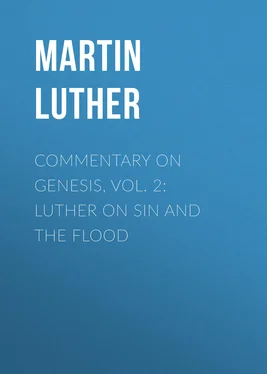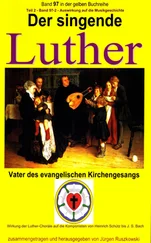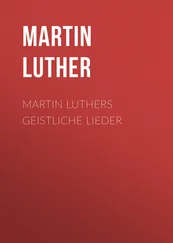Martin Luther - Commentary on Genesis, Vol. 2 - Luther on Sin and the Flood
Здесь есть возможность читать онлайн «Martin Luther - Commentary on Genesis, Vol. 2 - Luther on Sin and the Flood» — ознакомительный отрывок электронной книги совершенно бесплатно, а после прочтения отрывка купить полную версию. В некоторых случаях можно слушать аудио, скачать через торрент в формате fb2 и присутствует краткое содержание. Жанр: foreign_prose, foreign_religion, Философия, foreign_psychology, foreign_antique, на немецком языке. Описание произведения, (предисловие) а так же отзывы посетителей доступны на портале библиотеки ЛибКат.
- Название:Commentary on Genesis, Vol. 2: Luther on Sin and the Flood
- Автор:
- Жанр:
- Год:неизвестен
- ISBN:нет данных
- Рейтинг книги:4 / 5. Голосов: 1
-
Избранное:Добавить в избранное
- Отзывы:
-
Ваша оценка:
- 80
- 1
- 2
- 3
- 4
- 5
Commentary on Genesis, Vol. 2: Luther on Sin and the Flood: краткое содержание, описание и аннотация
Предлагаем к чтению аннотацию, описание, краткое содержание или предисловие (зависит от того, что написал сам автор книги «Commentary on Genesis, Vol. 2: Luther on Sin and the Flood»). Если вы не нашли необходимую информацию о книге — напишите в комментариях, мы постараемся отыскать её.
Commentary on Genesis, Vol. 2: Luther on Sin and the Flood — читать онлайн ознакомительный отрывок
Ниже представлен текст книги, разбитый по страницам. Система сохранения места последней прочитанной страницы, позволяет с удобством читать онлайн бесплатно книгу «Commentary on Genesis, Vol. 2: Luther on Sin and the Flood», без необходимости каждый раз заново искать на чём Вы остановились. Поставьте закладку, и сможете в любой момент перейти на страницу, на которой закончили чтение.
Интервал:
Закладка:
171. Let us not think, therefore, that God does not heed the shedding of our blood! Let us not imagine for a moment that God does not regard our afflictions! No! he collects all our tears, and puts them into his bottle, Ps 56, 8. The cry of the blood of all the godly penetrates the clouds and the heavens to the very throne of God, and entreats him to avenge the blood of the righteous, Ps 79, 10.
172. As these things are written for our consolation, so are they written for the terror of our adversaries. For what think you can be more horrible for our tyrants to hear than that the blood of the slain continually cries aloud and accuses them before God? God is indeed long-suffering, especially now toward the end of the world; and therefore sin lies the longer "at the door," and vengeance does not immediately follow. But it is surely true that God is most grievously offended with all this sin, and that he will never suffer it to pass unpunished.
173. Such judgment of God on Cain, however, I do not believe to have been executed on the first day, but some time afterward. For it is God's nature to be long-suffering, inasmuch as he waits for the sinner to turn. But he does not, on that account, fail to punish him. For he is the righteous judge both of the living and of the dead, as we confess in our Christian Faith. Such judgment God exercised in the very beginning of the world with reference to these two brothers. He judged and condemned the living murderer, and justified murdered Abel. He excommunicated Cain and drove him into such agonies of soul that the space of the whole creation seemed too narrow to contain him. From the moment Cain saw that God would be the avenger of his brother's blood, he felt nowhere safe. To Abel, on the other hand, God gave for enjoyment the full width of earth and heaven.
174. Why, then, should we ever doubt that God ponders and numbers in his heart the afflictions of his people, and that he measures our tears and inscribes them on adamantine tablets? And this inscription the enemies of the Church shall never be able to erase by any device whatever except by repentance. Manasseh was a terrible tyrant and a most inhuman persecutor of the godly. And his banishment and captivity would never have sufficed to blot out these sins. But when he acknowledged his sin and repented in truth, then the Lord showed him mercy.
So Paul had, and so the pope and the bishops have now, only one way left them: to acknowledge their sin and to supplicate the forgiveness of God. If they will not do this, God in his wrath will surely require at their hands the blood of the godly. Let no one doubt this!
175. Abel is dead, but Cain is still alive. But, good God, what a wretched life is that which he lives! He might wish never to have been born, as he hears that he is excommunicated and must look for death and retribution at any moment. And in due time this will be the lot of our adversaries and of the oppressors of the Church.
V. 11. And now cursed art thou from the ground, which hath opened its mouth to receive thy brother's blood from thy hand;
176. We have heard, so far, of the disclosure of Cain's sin through the voice of Abel's blood, of his conviction by Adam his father, and of the decision rendered with reference to the two brothers, namely, that the one should be canonized, or declared a saint—the first fruits, as it were, of the blessed seed; but that the other, the first-born, should be condemned and excommunicated, as shall presently be shown. Now Moses mentions the penalties to be visited upon such fratricide.
177. First of all, we should mark as particularly worthy of note the discrimination exercised by the Holy Spirit. Previously, when the penalty for his sin was inflicted upon Adam, a curse was placed not upon the person of Adam, but only upon the earth; and even this curse was not absolute but qualified. The expression is this: "Cursed is the ground for thy sake"; and in the eighth chapter of the Romans, verse twenty, we read: "The creature was made subject to vanity, not willingly." The fact is, that the earth, inasmuch as it bore guilty man, became involved in the curse as his instrument, just as also the sword, gold, and other objects, are cursed for the reason that men make them the instruments of their sin. With fine reasoning the Holy Spirit discriminates between the earth and Adam. He diverts the curse to the earth, but saves the person.
178. But in this instance the Holy Spirit speaks of Cain. He curses the person of Cain. And why is this? Is it because the sin of Cain, as a murderer, was greater than the sin of Adam and Eve? Not so. But because Adam was the root from whose flesh and loins Christ, that blessed seed, should be born. It is this seed, therefore, that was spared. For the sake of this seed, the fruit of the loins of Adam, the curse is transferred from the person of Adam to the earth. Thus, Adam bears the curse of the earth, but his person is not cursed; from his posterity Christ was to be born.
179. Cain, however, since he fell by his sin, must suffer the curse being inflicted upon his person. He hears it said to him, "Cursed art thou," that we might understand he was cut off from the glory of the promised seed, and condemned never to have in his posterity that seed through which the blessing should come. Thus Cain was cast out from the stupendous glory of the promised seed. Abel was slain; therefore there could be no posterity from him. But Adam was ordained to serve God by further procreation. In Adam alone, therefore, after Cain's rejection, the hope of the blessed seed rested until Seth was born unto him.
180. The words spoken to Cain, "Cursed art thou," are few, but nevertheless entitled to a great deal of attention, in that they are equal to the declaration: Thou art not the one from whom the blessed seed is hoped for. With this word Cain stands cast out and cut off like a branch from the root, unable longer to hope for the distinction around which he had circled. It is a fact, that Cain craved the distinction of passing on the blessing; but the more closely he encircled it the more elusive it became. Such is the lot of all evildoers: their failure is commensurate with their efforts to succeed.
181. From this occurrence originate the two churches which are at war with each other: the one of Adam and the righteous, which has the hope and promise of the blessed seed; the other of Cain, which has forfeited this hope and promise through sin, without ever being able to regain it. For in the flood Cain's whole posterity became extinct, so that there has been no prophet, no saint, no prince of the true Church who could trace his lineage back to Cain. All that was denied Cain and withdrawn from him, when he was told: "Cursed art thou."
182. We find added, however, the words, "from the ground." These words qualify the fearful wrath. For, if God had said, "from the heavens," he would have deprived his posterity forever of the hope of salvation. As it is, the words, "from the ground," convey, indeed, the menacing decision that the promise of the seed has been forfeited, but the possibility is left that descendants of Cain as individuals, prompted by the Holy Spirit, may join themselves to Adam and find salvation.
This, in after ages, really came to pass. While it is true the promise of the blessed seed was a distinction confined to the Jews, according to the statement in Psalm 147, 20: "He hath not dealt so with any nation," the Gentiles, nevertheless, retained the privilege of beggars, so to speak. It was in this manner that the Gentiles, through divine mercy, obtained the same blessing the Jews possessed on the ground of the divine faithfulness and promise.
183. In like manner, all rule in the Church was absolutely denied also to the Moabites and Amorites; and yet many private individuals among them embraced the religion of the Jews. Thus, every right in the Church was taken away from Cain and his posterity absolutely, yet permission was left them to beg, as it were, for grace. That was not taken from them. Cain, because of his sin, was cast out from the right of sitting at the family table of Adam. But the right was left him to gather up, doglike, the crumbs that fell from his father's table, Mt 15, 26-27. This is signified by the Hebrew expression min haadama , "From the ground."
Читать дальшеИнтервал:
Закладка:
Похожие книги на «Commentary on Genesis, Vol. 2: Luther on Sin and the Flood»
Представляем Вашему вниманию похожие книги на «Commentary on Genesis, Vol. 2: Luther on Sin and the Flood» списком для выбора. Мы отобрали схожую по названию и смыслу литературу в надежде предоставить читателям больше вариантов отыскать новые, интересные, ещё непрочитанные произведения.
Обсуждение, отзывы о книге «Commentary on Genesis, Vol. 2: Luther on Sin and the Flood» и просто собственные мнения читателей. Оставьте ваши комментарии, напишите, что Вы думаете о произведении, его смысле или главных героях. Укажите что конкретно понравилось, а что нет, и почему Вы так считаете.












